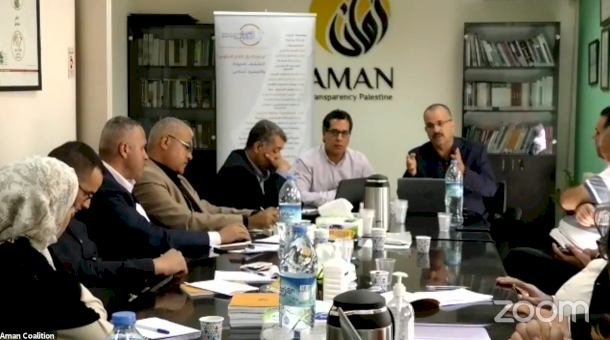
In a workshop on the reality of integrity, transparency, and accountability in the Agriculture Cluster Plan development and implementation,
The Civil Society Team for Enhancing Public Budget Transparency: Transparency and partnership with stakeholders is pivotal to determine needs and criteria and achieve desired results
Ramallah – The Civil Society Team for Enhancing Public Budget Transparency (“Team”) held a session to discuss the draft Report on the Reality of Integrity, Transparency, and Accountability in the Development and Implementation of the Agriculture Cluster Plan. Aimed at contributing to promoting governance of the agriculture cluster management, the discussion brought together relevant public institutions and civil society organisations involved in the agriculture sector.
Agriculture clusters: A strategic sector both nationally and economically
In his opening remarks, Mr. Amjad al-Battah, member of the Team, asserted that agriculture clusters are of strategic importance both nationally and economically. Agriculture is among key government development policies, demanding more participation and support by all public, private, and civil society actors. In particular, agriculture is among one of the most prominent sectors targeted by the Israeli occupying authorities with a view to displacing Palestinian citizens from their land. The report is a contribution by the Team to strengthen governance in the government’s implementation of the Agriculture Cluster Plan.
In his review of the report, Mr. Nasser Qadous, an expert in agriculture, first defined the development cluster as a “geographical concentration of interlinked, complementary, and relevant companies and institutions by sharing common relations and activities across value chains.” Mr. Qadous provided an overview of the most notable findings and recommendations of the report, including compliance with the values and principles of transparency and accountability in governance of the agriculture cluster management.
Promoting partnership and transparency in compiling and implementing the agriculture cluster plan enhances public confidence in the cluster model
The report stresses the compelling need to strengthen the principle of effective partnership in the process of cluster planning and implementation. To do so, cluster members will be involved in planning and consultation processes. Outcomes will be made clearly and publicly available.
The report recommends that the current context of each development cluster be revisited, using various needs assessment techniques and tools. This will ensure the engagement of relevant institutions and representatives of farmers (e.g. active associations). Clear criteria should be agreed on to select cluster initiatives, which are assessed on the basis of those criteria. As the principal reference point of the agriculture sector, the Ministry of Agriculture (MoA) will compile periodic progress reports on clusters with a view to monitoring the achievements scored by, and the challenges faced by, the agriculture cluster plan in various areas. These will be posted and made accessible to stakeholders on the MoA website and social media platforms.
There is a need to strengthen accountability, monitoring and evaluation of implementation
In relation to accountability systems, the report calls on the MoA to publish periodic progress reports on clusters to monitor the achievements scored by, and the challenges faced by, the agriculture cluster plan. These will be released in the media on a regular basis. In addition to monitoring and evaluation, the plan will include a system of accountability and learning based on the best practices and agreed principles in this field. As a key factor for the success of the plan, this exercise will facilitate the monitoring of achievements and accountability for any flawed implementation.
Bridging the gap in funding cluster plan implementation
The report provides an overview of the estimated budgets of all cluster development initiatives. Planning is premised on funding projections and amounts, which need to be provided by the government through the Ministry of Finance and various institutions. The plan largely relies on beneficiary contributions, which have subsequently been challenged by the government’s need to transfer budget line items in response to the COVID-19 pandemic and Israel’s plans to annex the Jordan Valley. Hence, while expecting major contributions from farmers, the plan implementation has been contingent on allocation of funds, putting at stake the realism of cluster plans.
The report recommends that focus be placed on innovative, collective initiatives, which bolster relations between members of single clusters. Manifold, individual initiatives need to be avoided.
A training programme to have a common understanding of the cluster-based development model
The report presents a set of recommendations aimed at strengthening governance of the management of agriculture cluster, which the government has embraced and entrusted to the MoA. First and foremost, planning committees will receive training on fundamentals of the cluster development-based model in order to harmonise understanding and ensure realistic planning. Committee members will, therefore, be able to explain these plans in consultative meetings with stakeholders, particularly grassroots organisations and local government units. Experts in cluster development will be trained and briefed about relevant previous experiences. To ensure sustainability, these experts will also be supported by a clear protocol on the operations of development clusters in Palestine.
The report further recommends that capacity building be provided to planning and implementation stakeholders to help apply integrity indicators and tools, ensuring easy accountability and flow of information. This activity will be tailored to improve trust in the Agriculture Cluster Plan.
Mr. Jihad Harb, Senior Researcher at the Coalition for Accountability and Integrity (AMAN), commended the MoA’s participation in the session. As the authoritative reference of the agriculture sector, the MoA has favourably responded and published the Agriculture Sector Strategy 2021-2023 and Agriculture Cluster Development Plan (Jericho and Jordan Valley, Jenin, and Qalqiliya) on the Ministry’s website. Mr. Harb advocated for an approach to being open to citizens and making information available to stakeholders on the MoA website and/or social media networks.
